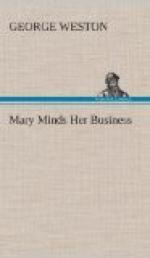“Your prodigal son who is eating husks now,
“Paul.”
Mary looked at the photograph—a pretty child with her hair over her shoulders and a smile in her eyes.
“You poor little thing,” she breathed, “and to think you’re my niece—and I’m your aunt ... Aunt Mary,” she thoughtfully repeated, and for the first time she realized that youth is not eternal and that years go swiftly by.
“Life’s the strangest thing,” she thought. “It’s only a sort of an accident that I’m not in her place, and she’s not in mine.... Perhaps I sha’n’t have any children of my own—ever—” she dreamed, “and if I don’t—it will be nice to think that I did something—for this one—”
For a moment the chill of caution went over her.
“Suppose it isn’t really Paul,” she thought. “Suppose—it’s some sharper. Perhaps that’s why dad never wrote him—”
But an instinct, deeper than anything which the mind can express, told her that the letter rang true and had no false metal in it.
“Or suppose,” she thought, “if he knows dad is dead—suppose he turns up and makes trouble for everybody—”
Wally’s story returned to her memory. “There was an accident out West—somebody killed. Anyhow he was blamed for it—so he could never come back or they’d get him—”
“That agrees with his living under this Russian name,” nodded Mary. “Anyhow, I’m sure there’s nothing to fear in doing a good action—for a child like this—”
She propped the picture on her desk and after a great deal of dipping her pen in the ink, she finally began—
“Dear Sir:
“I have opened your letter to my father, Josiah Spencer. He has been dead three years. I am his daughter.
“It doesn’t seem right that such a nice girl as Rosa shouldn’t have every chance to grow up good and happy. So I am writing the school you mentioned, and sending them the money as you suggest.
“She will probably need some clothes, as they always look at a girl’s clothes so when she goes to school. I therefore enclose something for that.
“Trusting that everything will turn out well, I am
“Yours sincerely,
“Mary Spencer.
“P.S. I would like Rosa to write and tell me how she gets on at school.”
She wrote the school next and when that was done she sat back in her chair and looked out of the window at the birds and the flowers and the bees that flew among the flowers.
“What a queer thing it is—love, or whatever they call it,” she thought. “The things it has done to people—right in this house! I guess it’s like fire—a good servant but a bad master—”
She thought of what it had done to Josiah—and to Josiah’s son. She thought of what it had done to Ma’m Maynard, what it was doing to Helen, how it had left Aunt Cordelia and Aunt Patty untouched.
“It’s like some sort of a fever,” she told herself. “You never know whether you’re going to catch it or not—or when you’re going to catch, it—or what it’s going to do to you—”




